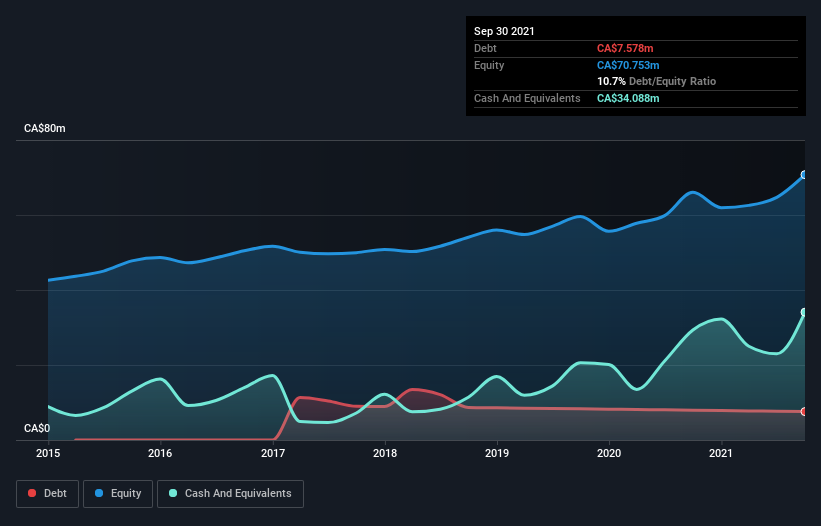Does PFB (TSE:PFB) Have A Healthy Balance Sheet?
The external fund manager backed by Berkshire Hathaway's Charlie Munger, Li Lu, makes no bones about it when he says 'The biggest investment risk is not the volatility of prices, but whether you will suffer a permanent loss of capital.' So it might be obvious that you need to consider debt, when you think about how risky any given stock is, because too much debt can sink a company. We can see that PFB Corporation (TSE:PFB) does use debt in its business. But should shareholders be worried about its use of debt?
When Is Debt Dangerous?
Debt and other liabilities become risky for a business when it cannot easily fulfill those obligations, either with free cash flow or by raising capital at an attractive price. If things get really bad, the lenders can take control of the business. While that is not too common, we often do see indebted companies permanently diluting shareholders because lenders force them to raise capital at a distressed price. Having said that, the most common situation is where a company manages its debt reasonably well - and to its own advantage. When we examine debt levels, we first consider both cash and debt levels, together.
Check out our latest analysis for PFB
What Is PFB's Net Debt?
The image below, which you can click on for greater detail, shows that PFB had debt of CA$7.58m at the end of September 2021, a reduction from CA$7.95m over a year. However, its balance sheet shows it holds CA$34.1m in cash, so it actually has CA$26.5m net cash.
How Strong Is PFB's Balance Sheet?
Zooming in on the latest balance sheet data, we can see that PFB had liabilities of CA$35.2m due within 12 months and liabilities of CA$8.54m due beyond that. Offsetting this, it had CA$34.1m in cash and CA$18.3m in receivables that were due within 12 months. So it can boast CA$8.73m more liquid assets than total liabilities.
This surplus suggests that PFB has a conservative balance sheet, and could probably eliminate its debt without much difficulty. Simply put, the fact that PFB has more cash than debt is arguably a good indication that it can manage its debt safely.
But the other side of the story is that PFB saw its EBIT decline by 2.4% over the last year. That sort of decline, if sustained, will obviously make debt harder to handle. There's no doubt that we learn most about debt from the balance sheet. But ultimately the future profitability of the business will decide if PFB can strengthen its balance sheet over time. So if you want to see what the professionals think, you might find this free report on analyst profit forecasts to be interesting.
Finally, while the tax-man may adore accounting profits, lenders only accept cold hard cash. PFB may have net cash on the balance sheet, but it is still interesting to look at how well the business converts its earnings before interest and tax (EBIT) to free cash flow, because that will influence both its need for, and its capacity to manage debt. During the last three years, PFB generated free cash flow amounting to a very robust 98% of its EBIT, more than we'd expect. That positions it well to pay down debt if desirable to do so.
Summing up
While it is always sensible to investigate a company's debt, in this case PFB has CA$26.5m in net cash and a decent-looking balance sheet. And it impressed us with free cash flow of CA$17m, being 98% of its EBIT. So we don't think PFB's use of debt is risky. Over time, share prices tend to follow earnings per share, so if you're interested in PFB, you may well want to click here to check an interactive graph of its earnings per share history.
At the end of the day, it's often better to focus on companies that are free from net debt. You can access our special list of such companies (all with a track record of profit growth). It's free.
Have feedback on this article? Concerned about the content? Get in touch with us directly. Alternatively, email editorial-team (at) simplywallst.com.
This article by Simply Wall St is general in nature. We provide commentary based on historical data and analyst forecasts only using an unbiased methodology and our articles are not intended to be financial advice. It does not constitute a recommendation to buy or sell any stock, and does not take account of your objectives, or your financial situation. We aim to bring you long-term focused analysis driven by fundamental data. Note that our analysis may not factor in the latest price-sensitive company announcements or qualitative material. Simply Wall St has no position in any stocks mentioned.

 Yahoo Finance
Yahoo Finance 
